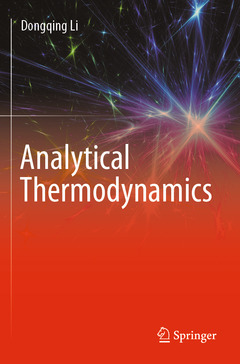Description
Analytical Thermodynamics, 1st ed. 2022
Author: Li Dongqing
Language: English
Subject for Analytical Thermodynamics:
Keywords
Analytical Thermodynamics; Advanced Thermodynamics; Entropy; Second Law of Thermodynamics; Surface Thermodynamics; Interfacial Phenomena; Thermodynamics in Gravitational Field; Thermodynamics in Centrifugal Field; Equilibrium Thermodynamics; Legendre Transformation; Thermodynamic Potentials; Entropy Maximum Principle; Energy Minimum Principle; Chemical Potentials; Droplets and Bubbles; Contact Angle; Heterogeneous Nucleation; Curvature Effects; Electric Field Effects; Solute Effect
Approximative price 68.56 €
In Print (Delivery period: 15 days).
Add to cartPublication date: 04-2023
194 p. · 15.5x23.5 cm · Paperback
Approximative price 94.94 €
In Print (Delivery period: 15 days).
Add to cartPublication date: 04-2022
194 p. · 15.5x23.5 cm · Hardback
Description
/li>Contents
/li>Biography
/li>Comment
/li>
Dongqing Li obtained his Ph.D. degree at the University of Toronto in 1991. In 1993, Dr. Li joined the faculty of the Department of Mechanical Engineering, University of Alberta, where he obtained tenure in 1997 and was promoted to the rank of full professor in 1999. He later joined the Department of Mechanical and Industrial Engineering, University of Toronto, in 2000 as a tenured full professor. From October 2005 to August 2008, Dr. Li was the H. Fort Flowers Chair Professor of Mechanical Engineering at Vanderbilt University, USA. Since September 2008, Dr. Li has joined the University of Waterloo as a tenured full professor, and he was the Canada Research Chair in Microfluidics and Nanofluidics from 2008 to 2013.
Unique textbook of analytical thermodynamics for graduate level courses
Presents modelling of homogeneous and heterogeneous systems
Include exercises and practice problems




